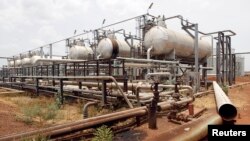A year of unrest in South Sudan has crippled the young nation's economy, experts say.
Hundreds of thousands of workers have been displaced from their homes by the fighting, and output of the government's main source of revenue, oil, is down sharply, says a senior economic analyst at the Juba-based Ebony Center for Strategic Studies, James Alic Garang.
Garang says entire communities have been deprived of their chief sources of livelihood because much of the labor force has been uprooted by the fighting.
"Let us take Malakal in Upper Nile state, for example, where a number of teachers were displaced," Garang said, referring to one of the three states hit hardest hit by the fighting. "These teachers are the breadwinners in their household, so this has a social impact on the household level."
"This household buys goods and services from the market, so if their income tumbles, that has a greater impact on the overall economy,” Garang said.
Oil production down
The fighting has also affected production of the country’s main source of revenue, oil, and hurt the national treasury.
Much of the fighting since December has been concentrated in the two oil producing states, Unity and Upper Nile, and in Jonglei state, which is also thought to have oil reserves. Foreign oil companies pulled their workers out of Unity and Upper Nile states when the fighting began and, although the workers are reported to be trickling back, oil production has fallen by nearly 30 percent, from around 250,000 barrels a day to around 160,000.
“Oil companies... have stopped work or they have suspended their work and, obviously, that has a lot of implication which means there is no flow of oil to the international market and, therefore, no income coming to oil companies or even to the government now,” said Simon Monoja Lubang, head of the College of Economics and Social Studies at the University of Juba.
Foreign investors
Because of the fighting, some foreign investors have abandoned plans to set up shop in South Sudan, Monoja and Garang said.
Ceasefire deals that are not respected are not helping to boost investor confidence, Garang said. A cessation of hostilities agreement that was signed in January and recommitted to at least three times was violated within hours each time.
"Investors may be looking at this critical situation. They are trying to see how the peace talks play out," Garang said. If peace is not restored, he said investors might give up on the idea of putting their money into a business in South Sudan.
But there is a saving grace for South Sudan, at least in terms of foreign investment: some investors did not leave the country when the fighting started in December last year.
"They remained here and whatever made them remain until today could be also be a positive factor that would attract more investors," Garang said, speculating that those who remained in the country did so because they felt "... investors are protected by the government and the public.”
The need to rebuild
Looking on the positive side, Garang said South Sudan could turn the misfortune of the conflict into a benefit. He said investors could be attracted to South Sudan, and particularly to Unity, Upper Nile and Jonglei states, which all need to be rebuilt after being at the epicenter of months of fighting.
But Monoja says the fighting has tarnished South Sudan’s image and that might destroy any chances of attracting new investors.
Fighting erupted in Juba on December 15 last year and quickly spread to other parts of the country. Just days before the violence began, hundreds of foreign companies attended an investment conference in Juba that the government saw as a first step towards breaking South Sudan’s dependence on oil. Fifty of those companies registered with the government to do business in South Sudan, but that was before the crisis hit. It is unclear if any of the companies at last year’s conference are doing business in South Sudan now.






